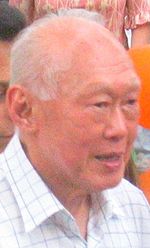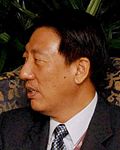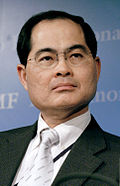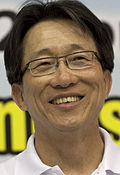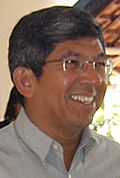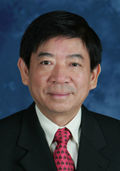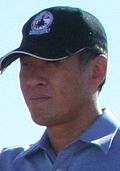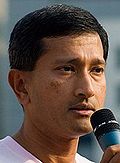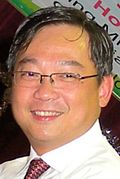- Cabinet of Singapore
-
Singapore 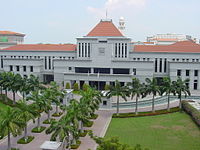
This article is part of the series:
Politics and government of
Singapore
- President: Tony Tan Keng Yam
- Government
- Prime Minister: Lee Hsien Loong
- Cabinet
- Government organisations
- Judicial system
- Chief Justice: Chan Sek Keong
- Supreme Court
(Court of Appeal and High Court) - Subordinate Courts
The Cabinet of Singapore forms the Government (executive branch) of Singapore together with the President of Singapore. It is led by the Prime Minister of Singapore who is the head of government. The Prime Minister is a Member of Parliament appointed by the President who selects a person that in his or her view is likely to command the confidence of a majority of the Parliament of Singapore. The other members of the Cabinet are Ministers who are Members of Parliament appointed by the President on the Prime Minister's advice. Cabinet members are prohibited from holding any office of profit and from actively engaging in any commercial enterprise.
The Cabinet generally directs and controls the Government and is collectively responsible to Parliament. It also has significant influence over lawmaking. Ministers may be designated by the Prime Minister to be in charge of particular ministries, or as Ministers in the Prime Minister's Office. Singapore's ministers are among the best paid in the world. As of January 2009, the Prime Minister's annual salary was S$3.04 million, while the pay of ministerial-grade officers was $1.57 million.
The earliest predecessor of the Cabinet was the Executive Council of the Straits Settlements, introduced in 1877 to advise the Governor of the Straits Settlements. It wielded no executive power. In 1955, a Council of Ministers was created, made up of three ex officio Official Members and six Elected Members of the Legislative Assembly of Singapore, appointed by the Governor on the recommendation of the Leader of the House. Following the general elections that year, David Saul Marshall became the first Chief Minister of Singapore. Constitutional talks between Legislative Assembly representatives and the Colonial Office were held from 1956 to 1958, and Singapore gained full internal self-government in 1959. The Governor was replaced by the Yang di-Pertuan Negara, who had power to appoint to the post of Prime Minister the person most likely to command the authority of the Assembly, and other Ministers of the Cabinet on the Prime Minister's advice. In the 1959 general elections, the People's Action Party swept to power with 43 out of the 51 seats in the Assembly, and Lee Kuan Yew became the first Prime Minister of Singapore. The executive branch of the Singapore Government remained unchanged following Singapore's merger with Malaysia in 1963, and subsequent independence in 1965.
Following the 2011 general election, a Cabinet reshuffle took place effective 21 May 2011. Lim Hng Kiang and Lim Swee Say respectively retained their Trade and Industry and Prime Minister's Office portfolios, while other ministers were given new appointments to the remaining 11 ministries. Heng Swee Keat and Chan Chun Sing, both elected to Parliament for the first time, were respectively assigned the posts of Minister for Education, and Acting Minister for Community Development, Youth and Sports.
Contents
History
Up to the outbreak of World War II, Singapore was part of the Crown colony known as the Straits Settlements together with Malacca and Penang. The earliest predecessor of the Cabinet was arguably the Executive Council of the Straits Settlements that was introduced in 1877 by letters patent issued by the Crown,[1] though its function was very different from that of today's Cabinet. The Council, which was composed of "such persons and constituted in such manner as may be directed" by royal instructions,[2] existed to advise the Governor of the Straits Settlements and wielded no executive power. The Governor was required to consult the Executive Council on all affairs of importance unless they were too urgent to be laid before it, or if reference to it would prejudice the public service. In such urgent cases, the Governor had to inform the Council of the measures he had taken.[3][4]
 Sir William Cleaver Francis Robinson (1834–1897), the Governor of the Straits Settlements when the Executive Council of the Straits Settlements was introduced in 1877
Sir William Cleaver Francis Robinson (1834–1897), the Governor of the Straits Settlements when the Executive Council of the Straits Settlements was introduced in 1877
Following the Second World War, the Straits Settlements were disbanded and Singapore became a Crown colony in its own right.[5] The reconstituted Executive Council consisted of six officials and four nominated "unofficials".[6] In February 1954, the Rendel Constitutional Commission under the chairmanship of Sir George William Rendel, which had been appointed to comprehensively review the constitution of the Colony of Singapore, rendered its report. Among other things, it recommended that a Council of Ministers be created, composed of three ex officio Official Members and six Elected Members of the Legislative Assembly of Singapore appointed by the Governor on the recommendation of the Leader of the House, who would be the leader of the largest political party or coalition of parties having majority support in the legislature. The recommendation was implemented in 1955.[7] In the general election held that year, the Labour Front took a majority of the seats in the Assembly, and David Saul Marshall became the first Chief Minister of Singapore. Major problems with the Rendel Constitution were that the Chief Minister and Ministers' powers were ill defined, and that the Official Members retained control of the finance, administration, and internal security and law portfolios. This led to confrontation between Marshall, who saw himself as a Prime Minister governing the country, and the Governor, Sir John Fearns Nicoll, who felt that important decisions and policies should remain with himself and the Official Members.[8][9]
In 1956, members of the Legislative Assembly held constitutional talks with the Colonial Office in London. The talks broke down as Marshall did not agree to the British Government's proposal for the casting vote on a proposed Defence Council to be held by the British High Commissioner to Singapore, who would only exercise it in an emergency. Marshall resigned as Chief Minister in June 1956, and was replaced by Lim Yew Hock.[10] The following year, Lim led another delegation to the UK for further talks on self-government. This time, agreement was reached on the composition of an Internal Security Council.[11] Other constitutional arrangements were swiftly settled in 1958, and on 1 August the Parliament of the United Kingdom passed the State of Singapore Act 1958,[12] granting the colony full internal self-government. Under Singapore's new constitution which came into force on 3 June 1959,[13] the Governor was replaced by the Yang di-Pertuan Negara (Head of State), who had power to appoint as Prime Minister the person most likely to command the authority of the Legislative Assembly, and other Ministers of the Cabinet on the Prime Minister's advice.[14] The Constitution also created the post of the British High Commissioner,[15] who was entitled to receive the agenda of each Cabinet meeting and to see all Cabinet papers. In the 1959 general elections, the People's Action Party swept to power with 43 out of the 51 seats in the Assembly, and Lee Kuan Yew became the first Prime Minister of Singapore. Nine other Ministers were appointed to the Cabinet.[16]
The British High Commissioner's role became that of an ambassador following Singapore's independence from Britain and merger with Malaysia in 1963. Apart from that the executive branch of the Singapore Government remained largely unchanged,[17] although now it governed a state within a larger federation. However, with effect from 9 August 1965, Singapore left the Federation of Malaysia and became a fully independent republic. On separation from Malaysia, the Singapore Government retained its executive authority, and the executive authority of the Parliament of Malaysia ceased to extend to Singapore and vested in the Singapore Government.[18] The Yang di-Pertuan Agong, the Supreme Head of State of Malaysia, also ceased to be the Supreme Head of Singapore and relinquished his sovereignty, jurisdiction, power and authority, executive or otherwise in respect of Singapore, which revested in the Yang di-Pertuan Negara of Singapore.[19] The Republic of Singapore Independence Act 1965[20] then vested the executive authority of Singapore in the newly created post of President, and made it exercisable by him or by the Cabinet or by any Minister authorized by the Cabinet.
Structure of government
Singapore inherited a Westminster system of government from the British. In such systems, there is an overlap between the executive and legislative branches of government. The head of state, who is the President of Singapore, is a member of both the executive Government of Singapore and the Parliament of Singapore but plays a minimal role in them. Executive power lies in the hands of the Cabinet, which is made up of the Prime Minister of Singapore (the head of government) and other Ministers.[21] At the same time, the Prime Minister and Ministers are also Members of Parliament (MPs).
Following constitutional reforms in 1991, the office of President was transformed from an appointed to an elected post. Thus, both the President and MPs are elected to their posts by the citizens of Singapore in separate elections.[22]
Appointment of Cabinet
The President appoints as Prime Minister an MP who, in his judgment, is likely to command the confidence of the majority of the MPs.[23] In practice, the Prime Minister is usually the leader of the political party holding the majority of the seats in Parliament.[24]
The President also appoints other Ministers to the Cabinet from among the MPs, acting in accordance with the Prime Minister's advice.[23] Any MP, including a Non-Constituency Member of Parliament (NCMP) or a Nominated Member of Parliament (NMP), may be appointed a Minister. Thus it is possible for a person who was not elected by voters to be appointed by Parliament as an NMP, then by the President as a Minister. In 1990, then Deputy Prime Minister Goh Chok Tong said in Parliament: "I would rather that a government has the flexibility to appoint the right person to be the minister for finance, than to compel that government to select from whoever is available in the House."[25] However, he added that the Government had no intention to appoint a Cabinet minister from among the NMPs at that time. In May 2009, MP Hri Kumar proposed during a Parliamentary debate that this stand be reconsidered as the Prime Minister would be able to draw on the experience of many capable Singaporeans. He expressed the view that this would not offend democratic principles. Singapore's Parliamentary system placed more weight on the party in power rather than individual MPs, and "Parliamentarians must still win the support from the ground and, ultimately, the PM and the ruling party and his Cabinet team will still be answerable to the electorate at elections."[26] Critics have commented that adopting the practice would disenchant Singaporeans, deepen the already parochial political culture, and lead to a lack of accountability and legitimacy.[27]
Before entering on the duties of their office, the Prime Minister and other Ministers must take and subscribe (sign) the Oath of Allegiance and an oath for the due execution of their offices before the President.[28] The Oath of Allegiance reads as follows:
I, [name], having been appointed to the office of [name of office], do solemnly swear [or affirm] that I will bear true faith and allegiance to the Republic of Singapore and that I will preserve, protect and defend the Constitution of the Republic of Singapore.[29]The oath for the due execution of the office of Prime Minister or a Minister is as follows:
I, [name], being chosen and appointed as Prime Minister [or Minister] of Singapore, do solemnly swear [or affirm] that I will at all times faithfully discharge my duties as Prime Minister [or Minister] according to law, and to the best of my knowledge and ability, without fear or favour, affection or ill-will.[30]Cabinet members are prohibited from holding any office of profit or actively engaging in any commercial enterprise.[31] In addition, they are required to comply with a Code of Conduct for Ministers.[32] For example, to counter potential allegations of corruption and unexplained wealth and to avoid potential conflicts between private interests and public responsibilities, the Code requires every Minister, upon appointment to office, to disclose in confidence to the President through the Prime Minister all sources of income other than his salary as a Minister and as an MP. This must include all assets, such as financial assets, real property, interests in any company or professional practice, and any other substantial personal assets as well as financial liabilities, including mortgages and borrowings.[33] A Minister must also "scrupulously avoid any actual or apparent conflict of interest between his office and his private financial interests".[34] Thus, a Minister is not permitted to accept any favour of any kind from persons in negotiation with, or seeking to obtain any licence or enter into any contractual relations with, the Government,[35] or to use official information that comes to him as a Minister for his own private profit or the profit of any family member or associate.[36]
Vacation of office
The President must declare the office of Prime Minister vacant if the Prime Minister resigns his office, or if the President, acting in his discretion, is satisfied that the Prime Minister has ceased to command the confidence of a majority of the MPs. In the latter situation, the President is required first to inform the Prime Minister of his evaluation in this regard, and if the Prime Minister requests him to, the President may dissolve Parliament instead of making a declaration of vacancy.[37] A general election must be held within three months after the dissolution of Parliament.[38] This gives the former Prime Minister the opportunity to consolidate support by receiving a fresh mandate at the polls.[24]
At present, it is not clear what evidence the President may rely on to be satisfied that the Prime Minister has ceased to command the confidence of a majority of MPs, as the Singapore courts have not yet had to decide the issue. In the Sarawak case of Stephen Kalong Ningkan v. Tun Abang Haji Openg,[39] decided on provisions similar to those in the Singapore Constitution, the court found that the phrase ceased to command the confidence of a majority of the Members of Parliament was a term of art which had to be signified by a formal vote of no confidence taken by the legislature. In contrast, a Sabah court held in Datuk Amir Kahar v. Tun Mohd Said bin Keruak, Yang di-Pertuan Agong Sabah[40] that loss of confidence could be assessed on the basis of evidence other than a legislative vote.[41] This might include, for instance, media reports or letters addressed to the President.
Other Cabinet ministers must vacate their office if they resign, or if their appointments are revoked by the President acting in accordance with the advice of the Prime Minister.[42] A person who has vacated his or her office as Minister may, if qualified, be subsequently appointed again as a Minister.[43]
The Prime Minister and other Ministers who make up the Cabinet do not vacate their offices upon a dissolution of Parliament, but continue in their posts until the first sitting of the next Parliament following a general election.[44]
Responsibilities and remuneration
 The Cabinet is headed by the Prime Minister, Lee Hsien Loong, photographed here on 21 November 2004
The Cabinet is headed by the Prime Minister, Lee Hsien Loong, photographed here on 21 November 2004
The executive authority of Singapore is vested in the President and is exercisable by him or by the Cabinet of Singapore or any Minister authorized by the Cabinet.[45] However, the President normally plays a nominal and largely ceremonial role in the executive branch of government. Although the President acts in his personal discretion in the exercise of certain functions as a check on the Cabinet and Parliament of Singapore,[46] he is otherwise required to act in accordance with the advice of the Cabinet or of a Minister acting under the general authority of the Cabinet.[47] It is the Cabinet that has the general direction and control of the Government.[48] As Singapore follows the Westminster system of government, the legislative agenda of Parliament is determined by the Cabinet. At the start of each new Parliamentary session, the President gives an address prepared by the Cabinet that outlines what the Cabinet intends to achieve in the session.[49]
Under the Constitution, the Cabinet is collectively responsible to Parliament.[48] In theory, Parliament acts as a check on the power of the Cabinet as Ministers are required to justify their actions and policies upon being questioned by MPs. However, in Singapore this is a weak check because the ruling People's Action Party holds a large Parliamentary majority, and party members who are MPs are required by party discipline to vote according to the party Whip's instructions.[41]
The Cabinet may not be summoned except by the authority of the Prime Minister.[50] As far as is practicable, the Prime Minister is required to attend and preside at Cabinet meetings, but in his absence he may appoint another Minister to preside.[51]
Whenever the Prime Minister is ill, absent from Singapore, or has been granted leave of absence from his duties, the functions conferred on him by the Constitution are exercisable by any other Minister authorized by the President.[52] In general, the President must act in accordance with the Prime Minister's advice in appointing a Minister for this purpose. However, the President may act in his own discretion if in his opinion it is impracticable to obtain the advice of the Prime Minister due to his illness or absence.[53]
Responsibilities of Ministers
The Prime Minister may, by giving written directions, charge any Minister with responsibility for any department or subject.[54] In practice, this is done by issuing notifications that are published in the Government Gazette. For instance, the Constitution of the Republic of Singapore (Responsibility of Senior Minister and Co-ordinating Minister for National Security, Prime Minister's Office) Notification 2009[55] states:
It is hereby notified for general information that, pursuant to Article 30(1) of the Constitution of the Republic of Singapore, the Prime Minister has directed that Mr S. Jayakumar shall, with effect from 1st April 2009, be charged with the responsibility for the following matters:- (a) national security issues involving or affecting more than one Ministry;
- (b) Chairmanship of the Security Policy Review Committee;
- (c) foreign policy issues involving or affecting more than one Ministry; and
- (d) foreign policy issues which involve legal negotiation or international adjudication,
Ministers may be designated by the Prime Minister to be in charge of particular ministries, or as Ministers in the Prime Minister's Office. Such Ministers were formerly known as Ministers without portfolio.
The Prime Minister may retain any department or subject in his charge.[56]
Remuneration
In 1994, Prime Minister Goh Chok Tong received a monthly salary of nearly S$96,000 (about $1.15 million a year), while other ministers earned about $48,900 a month ($586,800 a year). This made them among the highest paid government ministers in the world.[57] In October that year, the Government issued a white paper entitled Competitive Salaries for Competent & Honest Government[58] which proposed that the salaries of ministers and civil servants be pegged at two-thirds the average principal earned income of the top four earners in six professions: accounting, banking, engineering, law, local manufacturing firms and multinational corporations. These professions were chosen because their top members had general management skills which ministers also had to have. According to the white paper, the one-third "discount" would be "a visible demonstration of the sacrifice involved in becoming a minister". Although "[s]alaries should never be the motivation for persons to become ministers", the financial sacrifice had to be minimized if outstanding and committed Singaporeans were to be encouraged to take on the "risks and public responsibilities of a political career".[59] The benchmark would also be used to determine the pay of the President, Prime Minister, Deputy Prime Minister, Attorney-General, Chairman of the Public Service Commission and judges.[59]
Following Parliamentary approval of the white paper in November 1994,[60] the Government established an independent panel to examine the benchmark for the Prime Minister's salary. The panel's report, released in January 1995, recommended that the benchmark be about $1.6 million a year, but said it would be reasonable for the Prime Minister to be paid $2.4 million in view of his heavy responsibilities. The Government said that in three years it planned to raise the pay of the Prime Minister to $1.46 million and that of ministers to 60% of the benchmark, and in the "longer term" to $1.6 million and two-thirds of the benchmark respectively.[61]
In February 1996 it was reported that a survey of 19 countries by the World Economic Forum magazine World Link had found that political leaders and senior civil servants of Singapore had the highest salaries. The pay of the Singapore Prime Minister (S$1.1 million, or US$812,858) was almost five times the average pay of the chief political executives of the nations surveyed (US$168,291). Senior civil servants were paid US$292,714, almost three times their counterparts' average pay.[62]
In August 2000, in view of the Singapore economy's growth of almost 10% led by a rapid increase in exports, the salary of the Prime Minister was increased by 14% and those of other ministers by 12%. In response to public disquiet, Goh Chok Tong said that, spread across the population, the rises amounted to about $11 per person, equivalent to "about five plates of char kway teow [fried noodles with cockles] per Singaporean".[63] Subsequently, in late 2001, when Singapore experienced its worst recession in a generation, ministerial pay was reduced by more than 17%. Nonetheless, it was reported that the prime minister still earned a gross annual salary of about $1.03 million before the variable component was taken into account.[63]
In April 2007, the Prime Minister's annual salary increased to S$3.1 million (US$2.05 million), about five times that of the then President of the United States George W. Bush who earned US$400,000.[64] The annual entry-level salary for ministers increased from $1.2 million to $1.6 million, and was projected to rise to 88% of the private sector benchmark by the end of 2008. Almost half of ministers' pay packages was made up of an individual performance bonus decided by the Prime Minister, and a variable bonus component based on the country's prevailing gross domestic product and capped at eight months of each minister's annual salary.[65] The pay increases were justified by the Government on the grounds that the salaries had to keep pace with those in the private sector to attract the best talent and to avoid corruption. Teo Chee Hean, the Minister for Defence and minister in charge of the civil service, was reported as saying: "We don't want pay to be the reason for people to join [the government]. But we also don't want pay to be the reason for them not to join us, or to leave after joining us."[64] The increases sparked much debate both in and out of Parliament, with many people seeing ministerial pay as already being too high.[64] During a Parliamentary debate on the issue, Nominated Member of Parliament Thio Li-ann said: "It would be a sad indictment of my generation if no one came forward to serve without excessive monetary inducement, as to be bereft of deep convictions is to be impoverished indeed."[66] On 11 April 2007, the Prime Minister Lee Hsien Loong told Parliament: "To make it quite clear why I am doing this, and also to give me the moral standing to defend this policy with Singaporeans, I will hold my own salary at the present level for five years. The government will pay me my full salary, because that is the way the system will have to work, but for five years, whatever the increase in the salary above its present level, I will donate to suitable good causes."[67] The following day, it was clarified that the Prime Minister had decided to do so a while ago, and that he had not been influenced by pressure arising from the announcement of the ministerial pay rise.[68]
In 2008, the annual salary for entry-level ministers was $1,924,300.[69] In view of the worsening economic crisis in 2008–2009, as of January 2009 the Prime Minister's salary was cut to $3.04 million, while the pay of ministerial-grade officers was reduced by 18% to $1.57 million.[70] In November 2009 the Public Service Division announced that pay increments would be deferred for a second time in 2010 because of the uncertain economic recovery. A minister's 2009 salary of $1,494,700 per year was therefore 22% lower than what he or she received in 2008.[69]
Persons who have reached the age of 50 years and retired as MPs and who have served in this capacity for not less than nine years may be granted a pension for the rest of their lives. The annual amount payable is 1⁄30 of the person's highest annual salary for every completed year of service and 1⁄360 for every uncompleted year, up to a ceiling of two-thirds of the Member's annual salary.[71] In addition, a retired MP who is at least 50 years old and has for not less than eight years held the office of Prime Minister, Deputy Prime Minister, Senior Minister or Minister[72] may receive an additional pension each year of 1⁄27 of his or her highest annual salary for each completed year of service and 1⁄324 for each uncompleted year, subject again to a ceiling of two-thirds of the office-holder's annual salary.[73] Members who have reached the age of 55 years and have served not less than eight years as Ministers may be granted a pension even if they have not yet ceased to hold office.[74] No person has an absolute right to compensation for past services or to any pension or gratuity, and the President may reduce or withhold pensions and gratuities upon an MP's conviction for corruption.[75]
Current Cabinet
At the 2011 general election, Senior Minister Shunmugam Jayakumar did not contest his seat as part of the East Coast Group Representation Constituency and thus retired from the Cabinet.[76] Foreign Minister George Yeo and Minister in the Prime Minister's Office Lim Hwee Hua contested Aljunied GRC unsuccessfully, and were defeated by a team from the Workers' Party of Singapore.[77]
Following the election, on 14 May 2011, Minister Mentor Lee Kuan Yew and Senior Minister Goh Chok Tong tendered their resignations from the Cabinet, stating that they wished to give the Prime Minister a "fresh clean slate" in forming the Government and enable him to "have a completely younger team of ministers to connect to and engage with this young generation".[78] Goh was given the honorary title of Emeritus Senior Minister; the same title was offered to Lee but he declined. Lee and Goh were appointed as senior advisers to the Government of Singapore Investment Corporation (GIC) and the Monetary Authority of Singapore (MAS) respectively.[79]
Four days later, on 18 May, Prime Minister Lee Hsien Loong announced a new Cabinet line-up. In addition to Lee Kuan Yew, Goh Chok Tong, George Yeo and Lim Hwee Hua, four other ministers retired: Wong Kan Seng, Mah Bow Tan, Lim Boon Heng and Raymond Lim.[80] Two ministers, Lim Hng Kiang and Lim Swee Say, retained their respective Trade and Industry and Prime Minister's Office portfolios, while existing ministers were appointed to new positions in the remaining 11 ministries. S. Iswaran, formerly Senior Minister of State for Education and for Trade and Industry, was elevated to the Cabinet as Minister in the Prime Minister's Office, and Second Minister for Home Affairs and for Trade and Industry. Heng Swee Keat and Chan Chun Sing, both elected to Parliament for the first time, were respectively assigned the posts of Minister for Education, and Acting Minister for Community Development, Youth and Sports and Minister of State for the Ministry of Information, Communications and the Arts.[81] Heng was the first new MP directly appointed a full minister since 1984.[82]
With effect from 21 May 2011, the Cabinet of Singapore consists of the following persons:[83]
The names in bold are the surnames of Chinese persons, and the personal names of Indian and Malay persons (except for Vivian Balakrishnan and Tharman Shanmugaratnam, where they indicate surnames as well).
See also
- Cabinet (government)
- Government of Singapore
- List of past members of the Government of Singapore
- Parliament of Singapore
Notes
- ^ Letters patent dated 17 November 1877.
- ^ 1877 letters patent, Art. II.
- ^ Richard Olaf Winstedt (1931), The Constitution of the Colony of the Straits Settlements and the Federated and Unfederated Malay States, London: Royal Institute of International Affairs, p. 4.
- ^ Kevin Tan Yew Lee (1999), "A Short Legal and Constitutional History of Singapore", in Kevin Y[ew] L[ee] Tan, ed., The Singapore Legal System (2nd ed.), Singapore: Singapore University Press, p. 26 at 37, ISBN 9971-69-213-9 (pbk.).
- ^ By the Straits Settlements (Repeal) Act 1946 (9 & 10 Geo. VI, c. 37) and the Singapore Order-in-Council 1946, S. R. & O., 1946, No. 462 (UK), dated 27 March 1946.
- ^ Tan, "A Short Legal and Constitutional History of Singapore", p. 41.
- ^ By the Singapore Colony Order-in-Council 1955, S.I. 1955, No. 187 (UK).
- ^ Yeo Kim Wah ([1973]), Political Development in Singapore, 1945–55, [Singapore]: Singapore University Press, p. 62.
- ^ Tan, "A Short Legal and Constitutional History of Singapore", pp. 42–43.
- ^ C[onstance] M[ary] Turnbull (1977), A History of Singapore, 1819–1975, Kuala Lumpur; New York, N.Y.: Oxford University Press, p. 263, ISBN 019580354X.
- ^ Turnbull, p. 264.
- ^ 6 & 7 Eliz. II, c. 59.
- ^ Singapore (Constitution) Order-in-Council 1958, S.I. 1958, No. 156 (UK).
- ^ Singapore (Constitution) Order-in-Council 1958 (UK), Art. 21.
- ^ Singapore (Constitution) Order-in-Council 1958 (UK), Arts. 15–19.
- ^ Tan, "A Short Legal and Constitutional History of Singapore", pp. 44–45.
- ^ Tan, "A Short Legal and Constitutional History of Singapore", p. 46.
- ^ Constitution and Malaysia (Singapore Amendment) Act 1965 (No. 53 of 1965) (Malaysia), ss. 4 and 5.
- ^ Constitution and Malaysia (Singapore Amendment) Act 1965 (Malaysia), s. 6.
- ^ Republic of Singapore Independence Act 1965 (No. 9 of 1965) (1985 Rev. Ed.), s. 4.
- ^ Constitution of the Republic of Singapore (1999 Reprint), Art. 24(1).
- ^ Singapore Constitution, Arts. 17(2) ("The President shall be elected by the citizens of Singapore in accordance with any law made by the Legislature.") and 39(1) ("Parliament shall consist of — (a) such number of elected Members as is required to be returned at a general election by the constituencies prescribed by or under any law made by the Legislature; (b) such other members ... who shall be known as non-constituency Members ...; and (c) such other Members ... who shall be known as nominated Members ..." The procedure for elections is governed by the Presidential Elections Act (Cap. 240A, 2007 Rev. Ed.) and the Parliamentary Elections Act (Cap. 218, 2007 Rev. Ed.).
- ^ a b Singapore Constitution, Art. 25(1).
- ^ a b Thio Li-ann (1999), "The Constitutional Framework of Powers", in Kevin Y[ew] L[ee] Tan, ed., The Singapore Legal System (2nd ed.), Singapore: Singapore University Press, p. 67 at 84, ISBN 9971-69-213-9 (pbk.).
- ^ Speech of the First Deputy Prime Minister and Minister for Defence Goh Chok Tong on the Constitution of the Republic of Singapore (Amendment) Bill, Singapore Parliamentary Debates, Official Report (29 March 1990), vol. 55, col. 1045.
- ^ Speech of MP Hri Kumar Nair on the President's Address, Singapore Parliamentary Debates, Official Report (26 May 2009), vol. 86 (no column numbers assigned yet).
- ^ Jeremy Au Yong; Zakir Hussain (13 June 2009), "Nominated ministers: Good or bad idea?", The Straits Times: A32.
- ^ Singapore Constitution. Art. 27.
- ^ Singapore Constitution, 1st Sch., para. 2.
- ^ Singapore Constitution, 1st Sch. paras. 4 and 4A.
- ^ Singapore Constitution, Art. 33.
- ^ Lau Wah Ming, Secretary to the Cabinet (4 July 2005), Code of Conduct for Ministers, Cabinet of Singapore (reproduced on the Getforme Singapore website), http://www.getformesingapore.com/previous2005/020805_codeofconductforministers.htm, retrieved 26 April 2009.
- ^ Code of Conduct for Ministers, para. 1.1.
- ^ Code of Conduct for Ministers, para. 3.1.
- ^ Code of Conduct for Ministers, para. 3.4.
- ^ Code of Conduct for Ministers, para. 3.5.
- ^ Singapore Constitution, Art. 26(1).
- ^ Singapore Constitution, Art. 66.
- ^ [1966] 2 M.L.J. [Malayan Law Journal] 187, declining to apply the approach taken by the Privy Council on appeal from Western Nigeria in Adegbenro v. Akintola [1963] A.C. 614. See also Thio Su Mien (1966), "Dismissal of Chief Ministers", Malaya Law Review 8: 203.
- ^ [1995] 1 M.L.J. 169.
- ^ a b Thio, "The Constitutional Framework of Powers", p. 85.
- ^ Singapore Constitution, Art. 26(2).
- ^ Singapore Constitution, Art. 26(3).
- ^ Art. 26 of the Constitution does not list the dissolution of Parliament as a ground on which the Prime Minister and Minister must vacate their offices. In addition, Art. 25(2) states that an MP may be appointed as Prime Minister by the President when Parliament is dissolved, but that MP shall not continue to hold office after the first sitting of the next Parliament unless he is also an MP of that Parliament.
- ^ Singapore Constitution, Art. 23(1).
- ^ See, generally, Art. 21(2) of the Singapore Constitution.
- ^ Singapore Constitution, Art. 21(1).
- ^ a b Singapore Constitution, Art. 24(2).
- ^ (PDF) Standing Orders of Parliament (as amended on 19 October 2004), Parliament of Singapore, 19 October 2004, archived from the original on 26 May 2009, http://www.webcitation.org/5h40VkRsP, retrieved 25 May 2009, Orders 15(1) ("At the conclusion of the President's speech delivered at the opening of any session, Parliament shall stand adjourned without any question being put. The Leader of the House shall give two clear days' notice naming an ordinary sitting day, not less than two clear days after the day on which the speech was delivered, for the next sitting of Parliament, and Parliament shall sit on the day stated in such notice.") and 15(2) ("Such notice shall also give notice for such sitting day, of a motion to be moved by a Minister or other Member named by the Leader of the House that an Address expressing the thanks of Parliament for the speech of the President be agreed to. Debate thereon shall be confined to the policy of the Government as outlined in the speech."). See also Singapore Constitution, Art. 62: "The President may address Parliament and may send messages thereto."
- ^ Singapore Constitution, Art. 28(1).
- ^ Singapore Constitution, Art. 28(2).
- ^ Singapore Constitution, Art. 26(4)(a). The President may revoke any such authority: Art. 26(4)(b).
- ^ Singapore Constitution, Art. 26(4)(c).
- ^ Singapore Constitution, Art. 30(1).
- ^ S 142/2009.
- ^ Singapore Constitution, Art. 30(2).
- ^ Singapore ministers, top bureaucrats get pay hike, Reuters, 22 October 1994.
- ^ Competitive Salaries for Competent & Honest Government: Benchmarks for Ministers & Senior Public Officers: White Paper [Cmd. 13 of 1994], Singapore: Prime Minister's Office, 1994, ISBN 9789971884437 (pbk.).
- ^ a b Chuang Peck Ming (22 October 1994), "Six professions to set pay for ministers and civil servants", Business Times (Singapore). See also Wang Hui Ling; Chung Tsung Mien; Jimmy Yap (28 October 1994), "32 say benchmarks too high, 25 think they are valid", The Straits Times; Warren Fernandez (2 November 1994), "Will S'poreans back SM Lee's judgment on White Paper?", The Straits Times; Chuang Peck Ming (4 November 1994), "MP warns of election backlash in debate on pay rise for ministers", Business Times (Singapore).
- ^ Chuang Peck Ming (1 November 1994), "Why it's fitting to peg ministers' pay to top private sector earners", Business Times (Singapore); Chuang Peck Ming (4 November 1994), "White paper on salary benchmarks approved", Business Times (Singapore).
- ^ Chuang Peck Ming (13 January 1995), "Independent panel recommends S$1.6m annual salary for S'pore PM", Business Times (Singapore).
- ^ Chua Mui Hoong (4 February 1996), "Ministers' pay – essential move despite political cost", The Straits Times.
- ^ a b Jake Lloyd-Smith (12 January 2003), "A lesson from the Lion City", South China Morning Post: 3.
- ^ a b c Derrick Ho (9 April 2007), Singapore's government ministers to get pay raise of more than 60 percent by 2008, Associated Press.
- ^ Derrick A. Paulo (10 April 2007), "In phases, tied to performance; Starting pay for ministers upped to $1.6m for now; 95% of civil servants will get raise", Today: 3.
- ^ Lydia Lim (27 April 2007), "Beware a poverty of convictions", The Straits Times.
- ^ Daniel Buenas (12 April 2007), "PM Lee to donate salary increase for next 5 years to charity", Business Times (Singapore); see also Singapore PM in damage control on salary: analysts, Agence France Presse, 12 April 2007.
- ^ "PM decided to donate his pay hikes a while ago", The Straits Times, 13 April 2007.
- ^ a b Sue-Ann Chia (27 November 2009), "Pay package of top civil servants and ministers down 22%", The Straits Times: A6.
- ^ Kenny Chee (25 November 2008), "Cut in annual pay for top civil servants", My Paper: A2.
- ^ Parliamentary Pensions Act (Cap. 219, 1996 Rev. Ed.), s. 3.
- ^ The Parliamentary Pensions Act, s. 2(1), defines office as "the office of Prime Minister, Deputy Prime Minister, Speaker, Senior Minister, Minister, Senior Minister of State, Minister of State, Mayor, Senior Parliamentary Secretary, Parliamentary Secretary or Political Secretary".
- ^ Parliamentary Pensions Act, s. 4.
- ^ Parliamentary Pensions Act, s. 5.
- ^ Parliamentary Pensions Act, s. 13.
- ^ Zakir Hussain (25 March 2011), "Veterans Jayakumar and Abdullah stepping down", The Straits Times; Leong Wee Keat (26 March 2011), "East Coast: The GRC to watch?", Today, archived from the original on 18 May 2011, http://www.webcitation.org/5ymSeV157.
- ^ "81–6: Workers' Party wins Aljunied GRC; PAP vote share dips to 60.1%", The Sunday Times (Singapore): 1 & 4, 8 May 2011; Low Chee Kong (8 May 2011), "A new chapter and a time for healing: PAP wins 81 out of 87 seats; WP takes Hougang, Aljunied", Today (Special Ed.): 1 & 4, archived from the original on 9 May 2011, http://www.webcitation.org/5yYNeUrg8.
- ^ Singapore founding father Lee Kuan Yew resigns, BBC News, 14 May 2011, http://www.bbc.co.uk/news/world-asia-pacific-13400296; Zuraidah Ibrahim (15 May 2011), "Lee Kuan Yew steps down: He and Goh Chok Tong retire to give PM room to break from the past", The Sunday Times (Singapore): A1–A2; Eugene K[heng] B[oon] Tan (16 May 2011), "A new, post-Lee Kuan Yew era: Departure reinforces belief that Singapore system based on institutions not personalities", Today, archived from the original on 18 May 2011, http://www.webcitation.org/5ymTThwjE.
- ^ Zakir Hussain (19 May 2011), "PM accepts MM, SM's offer to step down: They will be senior advisers to GIC, MAS respectively", The Straits Times: A3; Leong Wee Keat, "MM Lee and SM Goh to become Senior Advisers to GIC, MAS respectively", Today: 4, archived from the original on 19 May 2011, http://www.webcitation.org/5yn2EpRM5.
- ^ Neo Chai Chin; Ng Jing Yng (19 May 2011), "Three other ministers step down ...: Mr Wong Kan Seng, Mr Mah Bow Tan and Mr Raymond Lim", Today: 10, archived from the original on 21 May 2011, http://www.webcitation.org/5ypO1hLKK.
- ^ Lydia Lim (19 May 2011), "Radical reshuffle", The Straits Times: A1 & A4; Loh Chee Kong, "PM goes for a 'radical change': I wanted a fresh start, says Prime Minister", Today: 1 & 3, archived from the original on 19 May 2011, http://www.webcitation.org/5yn252RLL.
- ^ Rachel Chang (19 May 2011), "First new MP named minister since 1984: But former MAS chief is heading Education, not Finance as some expected", The Straits Times: A7; Esther Ng (19 May 2011), "Immediate appointments not surprising", Today: 6, archived from the original on 19 May 2011, http://www.webcitation.org/5yn2Rmsj5.
- ^ "PM's new cabinet" (PDF), The Straits Times: A7, 19 May 2011, archived from the original on 19 May 2011, http://www.webcitation.org/5yn1RJ5s1.
References
- Chia, Sue-Ann (27 March 2009), "Teo Chee Hean named Deputy Prime Minister", The Straits Times (reproduced on the website of the Prime Minister's Office): A1, archived from the original on 25 April 2009, http://www.webcitation.org/5gHMLiKv1.
- Constitution of the Republic of Singapore (1999 Reprint).
- Lau, Wah Ming, Secretary to the Cabinet (4 July 2005), Code of Conduct for Ministers, Cabinet of Singapore (reproduced on the Getforme Singapore website), archived from the original on 12 June 2008, http://web.archive.org/web/20080612064850/http://www.getformesingapore.com/previous2005/020805_codeofconductforministers.htm, retrieved 26 April 2009.
- Loh, Chee Kong (27 March 2009), "A team for new challenges", Today: 1, 3, archived from the original on 25 April 2009, http://www.webcitation.org/5gHMyyjqu.
- Parliamentary Pensions Act (Cap. 219, 1996 Rev. Ed.).
- Tan, Kevin Yew Lee (1999), "A Short Legal and Constitutional History of Singapore", in Tan, Kevin Y[ew] L[ee], ed., The Singapore Legal System (2nd ed.), Singapore: Singapore University Press, pp. 26–66, ISBN 9971-69-213-9 (pbk.).
- Thio, Li-ann (1999), "The Constitutional Framework of Powers", in Tan, Kevin Y[ew] L[ee], ed., The Singapore Legal System (2nd ed.), Singapore: Singapore University Press, pp. 67–122, ISBN 9971-69-213-9 (pbk.).
Further reading
- Chan, Helena H[ui-]M[eng] (1995), "The Executive", The Legal System of Singapore, Singapore: Butterworths Asia, pp. 22–29, ISBN 9780409997897 (pbk.).
- Jennings, Ivor (1980), Cabinet Government (3rd ed.), Cambridge: Cambridge University Press, ISBN 0521054303, ISBN 9780521095709.
- Quah, John S.T. (2003), "Paying for the 'Best and Brightest': Reward for High Public Office in Singapore", in Hood, Christopher; Peters, B. Guy; Lee, Grace O.M., eds. (PDF), Reward for High Public Office: Asian and Pacific Rim States [Routledge research in comparative politics; 3], London: Routledge, pp. 145–162, ISBN 9780415303491, archived from the original on 26 May 2009, http://www.webcitation.org/5h491QLRh.
- Tan, Kevin Y[ew] L[ee]; Thio, Li-ann (1997), "The Executive", Tan, Yeo & Lee's Constitutional Law in Malaysia and Singapore (2nd ed.), Singapore: Butterworths Asia, pp. 181–243, ISBN 9780409999082 (pbk.).
- Thio, Li-ann (1995), "Government and the State" (PDF), ASEAN Legal Systems, Singapore: Butterworths Asia for the ASEAN Law Association, ISBN 9780409998023, archived from the original on 4 December 2009, http://www.webcitation.org/5llsGoDr9.
External links
- Official website of the Cabinet of Singapore
- Appointments to the Cabinet of Singapore
- Official website of the Government of Singapore
 Current members of the Cabinet of Singapore
Current members of the Cabinet of SingaporePrime Minister Deputy Prime Ministers Cabinet Ministers Chan Chun Sing (Community Development, Youth and Sports) · Ng Eng Hen (Defence) · Heng Swee Keat (Education) · Vivian Balakrishnan (Environment and Water Resources · K. Shanmugam (Foreign Affairs/Law) · Gan Kim Yong (Health) · Yaacob Ibrahim (Information, Communications and the Arts/Muslim Affairs) · Khaw Boon Wan (National Development) · Lim Swee Say (Prime Minister's Office) · S. Iswaran (Prime Minister's Office) · Lim Hng Kiang (Trade and Industry) · Lui Tuck Yew (Transport)
As of 21 May 2011Constitution of the Republic of Singapore Fundamental liberties Article 9 • Article 10 • Article 11 • Article 12 • Article 13 • Article 14 • Article 15 • Article 16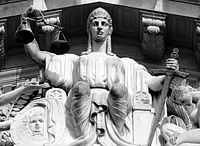
The Government The Legislature President • Parliament • Speaker • Elections (Presidential and Parliamentary) • Group Representation Constituency • Non-constituency Member of Parliament • Nominated Member of ParliamentThe Presidential Council for Minority Rights The Judiciary Supreme Court (Court of Appeal and High Court) • Subordinate Courts • Chief Justice • Judicial officersThe Public Service Citizenship Special powers against subversion
and emergency powersLaw of Singapore Constitutional law Executive branch: Government • President • Cabinet • Prime Minister • Attorney-General
Legislative branch: President • Parliament
Judicial branch: Judicial system • Judicial independence • Judicial officers • Constitution of the Republic of Singapore Tribunal • Supreme Court (Court of Appeal and High Court) • Subordinate Courts
Constitution: Constitution of Singapore • Elections • Human rights • Internal Security Act • Presidential Council for Minority Rights • Singaporean nationality law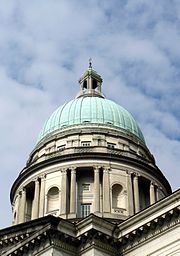
Administrative law Bias • Legitimate expectation • Wednesbury unreasonablenessCivil procedure Electronic Filing System • Integrated Electronic Litigation SystemCriminal law Family law National cabinets of Asia Sovereign
states- Afghanistan
- Armenia
- Azerbaijan
- Bahrain
- Bangladesh
- Bhutan
- Brunei
- Burma (Myanmar)
- Cambodia
- People's Republic of China
- Cyprus
- East Timor (Timor-Leste)
- Egypt
- Georgia
- India
- Indonesia
- Iran
- Iraq
- Israel
- Japan
- Jordan
- Kazakhstan
- North Korea
- South Korea
- Kuwait
- Kyrgyzstan
- Laos
- Lebanon
- Malaysia
- Maldives
- Mongolia
- Nepal
- Oman
- Pakistan
- Philippines
- Qatar
- Russia
- Saudi Arabia
- Singapore
- Sri Lanka
- Syria
- Tajikistan
- Thailand
- Turkey
- Turkmenistan
- United Arab Emirates
- Uzbekistan
- Vietnam
- Yemen
States with limited
recognition- Abkhazia
- Nagorno-Karabakh
- Northern Cyprus
- Palestine
- Republic of China (Taiwan)
- South Ossetia
Dependencies and
other territories- Christmas Island
- Cocos (Keeling) Islands
- Hong Kong
- Macau
Categories:- Government of Singapore
- National cabinets
- Members of the Cabinet of Singapore
Wikimedia Foundation. 2010.

